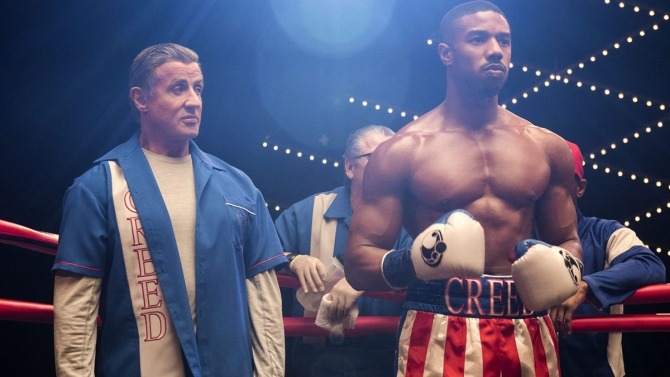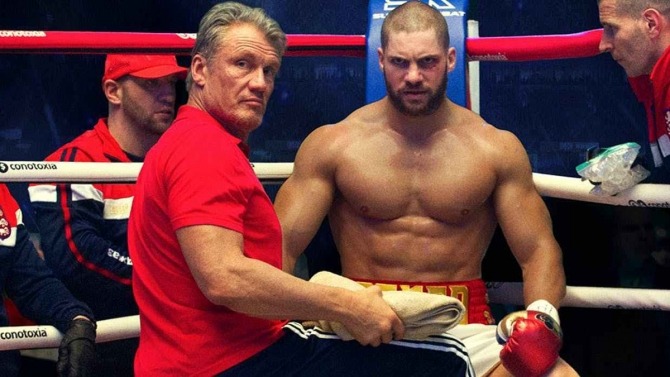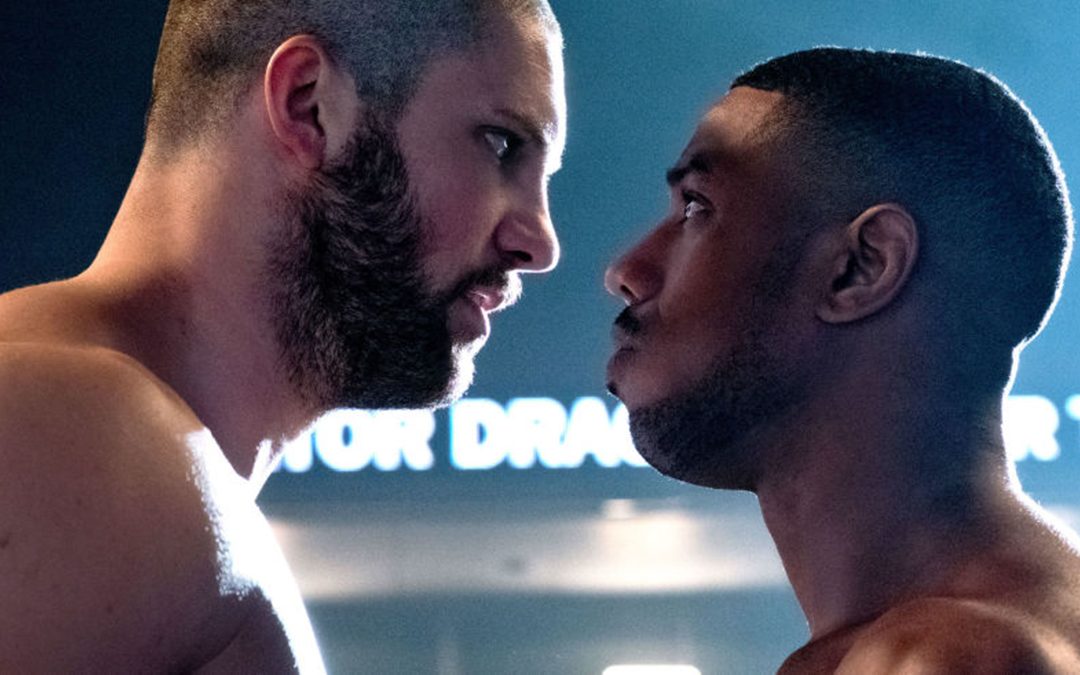Since the advent of Rocky Balboa and the first Creed, the Rocky franchise has never been stronger – and with Creed II hitting the big screen, its success seems destined to continue. With its heady mixture of nostalgia, raw human emotion and the kind of visceral boxing scenes that will have you flinching in your seat, Creed II is a superb entry that manages to continue Donnie’s (Michael B Jordan) story, this time shadowed by the one name that fundamentally changed his life – Drago.
By the time Rocky IV landed, the films had lost a lot of the credibility that earned the first film its Oscars, yet for many of us the entertainment and love never faded, apart from perhaps with Rocky V. Still, there’s something to love in every Rocky film and regardless of where you stand on the politics of Ivan Drago’s first appearance, IV will always remain a favourite.
While the novelty of having both Sylvester Stallone and Dolph Lundgren back together on screen has already been satiated by The Expendables trilogy, there’s something uniquely powerful about watching them reprise their roles from 1985, especially in the grittier new reality of the universe, where the ramifications of Apollo Creed’s death are still felt decades later and some of them are especially dark.
Following on from Ryan Coogler (who went on to Black Panther after Creed) in the director’s chair is Steven Caple Jr. who, similarly, has an independent background and only one previous feature film on his CV (2016’s The Land). Not that you’d know it from the assured way that the drama and action are portrayed, with both able to extract both sweat and tears in equal measure (you can read our review here). We caught up with him to discuss Creed II and the pressures of stepping into the ring with these iconic heavyweights…

Some people might underestimate this franchise as a result of some of the sequels. But since Rocky Balboa, and then the first Creed and now your movie – it’s like a heightened reality that puts a lot more emphasis back on the characters and the drama. Was that important to you coming into the franchise?
Completely man, I’m a fan as well, so when going back into the franchise I was trying to pull the right things from Rocky IV. It’s so iconic and I was being very delicate with which moments and which fights and how to pay homage to it, when we were starting to do this one. Tonally, you’re right, trying to make sure that the characters were layered in depth, they felt human – I wanted to humanise everyone, regardless if they were looked at as the “bad guys”. So for me, I was just really trying to tap into what was important in Drago’s life, how can we take it from him and how can we bring it back, so that everyone has a goal in this film rather than just breaking people, even though I know people want to watch others getting broken!
You mentioned being a fan – did you grow up with these movies?
Yeah, I’m a little younger than some of the fans! [Laughs] The first one I saw was Rocky V – that was actually the first one, but then I had to go backwards and watch them all. But yeah, I’ve seen every one of them and by the time Balboa came out I was well caught up. I was excited when Balboa came out. It’s interesting just being born later, but yet still having the same love for it that others do. Even me just being someone who’s a black kid from Cleveland, Ohio who loves Rocky, this Italian character who motivated me to go work out, or do whatever it is that I want to do. But I think everyone felt connected to Rocky in some sort of way. He felt normal, he felt flawed – he felt like…me, you know?
And for those fans who are invested in it, this franchise carries real emotional resonance…
It completely it does and again of course there’s the nostalgia of it all, but it felt like you’ve been with these characters for so long. One of the reasons the first Creed did really well was because when you found out Rocky had cancer, I was like, “Oh no, is this going to be the time?” and I know people are coming to see Creed II are thinking, “Is he still going/how is he?”
I’m not going to spoil it but ultimately, yeah, it’s what brings you back – to get that feeling again and for people to care. I knew for me going into a sequel, I had to make sure people cared for the characters beyond just the fighting. Going to the Rocky franchise, I felt there were a few moments where it would start to become just about the fight – but there’s always this heart to it that I felt people kept coming back to, even in Rocky V which people considered the worst one, that I still think there’s some heart in there.
The Viktor Drago (Florian Munteanu) story is very understated in how it is portrayed – at the beginning of the film, Ivan gives him a punch in the chest to get him up, but then he has the line in Rocky’s restaurant about “All he’s known is this” and shows his fists and you just think, “Oh my god, how far does that go in terms of how he punishes his son?”
Yeah and then you obviously see how far he’s willing to go, before he doesn’t want to go further… I wanted to establish the relationship; it’s a bit dark. You know, I call him a pageant father. You know how like pageant mums are where they tell their kids, “You have to be perfect, stand up straight!” It’s like that, but a little darker in the sense that it’s more physical, because there are two males who are dominating and intimidating, so there is this factor of fear, but then there’s also this aspect of sadness and desperation that I play with within the film to make sure that they were coming from a place that had purpose and they want to redeem themselves, rather than just being a revenge story.

And there are thee great nuances in Florian performance, as he doesn’t have that much dialogue, with these little looks every now and again, where you see this physically intimidating person just looking heartbroken for a second and it cuts right through you.
Yeah, and it was tough because you want him to convey so much – at least I did – on screen, but I didn’t want it to be all dialogue because one, they had to learn Russian so they spoke a lot of Russian which was new to both of them, but the other half was just…He’s a pitbull – I wanted to treat him like that kind of dog, that was always lurking behind his dad every second. So without saying anything, how can we visually tell the story? So through the auditioning process, he had to do that, he had to perform with just his eyes, so it was all about chemistry between him and Dolph.
When you’re stepping into this franchise, there must be a lot of pressure already and then particularly if you’re shooting boxing scenes and you’ve got Stallone and Lundgren in there.
Yeah 40-plus years of boxing and then Stallone who has been in the game for so long and you’ve got Lundgren who’s been his go-to villain, who’s also iconic – there’s this certain expectation of pressure for a fight to be epic, they want to feel the punches, so my approach was different from like a Creed one in a sense, because it was less so about the technique, but more about the power and the emotional and the stake behind each fight, just because of the expectations that you’re talking about. So I just wanted to elevate that, I wanted everything to be intense, to be super aggressive. It was like “He’s coming out for vengeance and he’s about to take this dude’s head off”, so I had to play that out with the boxing. Again, I hope the people in the theatre are weaving and covering their eyes every time they feel these punches and these throws.
Did Stallone give you any input on the fight choreography?
Oh completely man, I think that on the very first day we met, we were already watching Rocky clips, so when I first met him he was talking about how he wanted to bring back some of the poetry from the other Rocky movies and I was on the same page, so it worked perfectly. We started watching the clips together – of the Rocky/Drago fight, of the Clubber Lang fights [from Rocky III]. He was showing me all the match ups and his techniques and he was showing me how the story works from round to round. Then in our film, we have a blend of Rocky III and Rocky IV in the sense of how the fight structures are laid out.
So, we spent a lot of time watching those and then showing who’s supposed to win what round, what moments, when is the switch… He’s great at story arcs and then beyond that, the techniques, then he kind of let me flow. He was like: “It’s your style on this one, so camera wise you place in the area where you think you can feel the punches and do you.” But story-wise, he helped a lot with the execution. Sly knows a lot about how to work efficiently under so much time pressure, because there’s so many cameras and stuff like that – and this is my first time [on a film like this], so I would go to the master mentor and say “How can I make this faster, how can I work within these parameters?” and he just knows a lot, man, he’s got a wealth of knowledge.
It’s a big thing to step into. With the intimate character drama you have experience and then suddenly you’ve got the physicality of this film and the expectation.
Completely, completely. But even with the fights, Sly knows that a lot of that stuff isn’t important unless you feel for the people on screen. He would always say that it’s always about the corner moments, round by round – the moments when people are talking in the corner, they mean something, so don’t spend too much time on the “Huh, huh, huh!” [demonstrates the punching] as he would call it, go into the story beats and the drama – the heart.
Creed II is out in cinemas now

